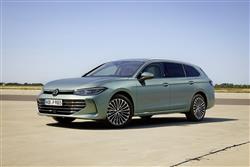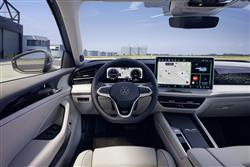Volkswagen Passat - ABC Leasing
How will you view?
This is a sample, showing 30 seconds of each section.
RECOGNISABLY PASSAT(some text hidden)
By Jonathan Crouch
Ten Second Review word count: 50
The ninth generation Volkswagen Passat comes only as an estate, with a more spacious interior and a premium-style cabin. There's a more sophisticated MQB Evo platform, a new era of media connectivity and the option of a PHEV powertrain that might encourage you to put off that switch to EV.
Background word count: 179
Mindful of European government and consumer indecision when it comes to the impending switch to EVs, Volkswagen has granted a stay of execution to its traditional combustion model lines. Which is why we still have a Golf as well as an ID.3, a Tiguan as well as an ID.4 and, as in this case, a Passat alongside an ID 7. The brand can't continue to invest in development of the old badges as it once did though, which is why this ninth generation Passat shares everything under the skin with the fourth generation Skoda Superb that's built alongside it at VW's plant in Bratislava, Slovakia. It also has something to do with the fact that you can only now have your Passat as an estate. You can see why Volkswagen was unwilling to let the Passat nameplate go just yet. A part of the company's line-up since 1973, it's racked up over 30 million sales. Though its days of big production volumes are over, there's still plenty here to please model line loyalists in this, the largest Passat yet.
Driving Experience word count: 271
Quite a bit's new in the apparently familiar powerplant line-up, but the key engineering change for this MK9 Passat is its MQB Evo platform, shared with the MK3 Tiguan. It's a key contributor to this B9-series model's newfound 'big car' feel - and has been engineered to take a full-EV powertrain, though there's no sign of that just yet. Surprisingly, Volkswagen is no longer offering the 2.0-litre TDI diesel that was the default choice of most customers in the previous generation. There's no 4MOTION 4WD option either, though both of these things are still available in other markets. Instead, your Passat will have to come with a 1.5-litre petrol engine: either there's a conventional 48V mild hybrid eTSI model with 150PS. Or the same engine provides the basis for a couple of PHEV variants with either 204PS or 272PS. These use a much bigger 19.7kWh battery than the old Passat PHEV, hence a considerably increased EV driving range of up to 82 miles. Still want that diesel? All eTSI Passats must have 7-speed DSG auto transmission; there's a 6-speed DSG auto in the eHybrids. To improve handling, Volkswagen has fitted the Vehicle Dynamics Manager system originally developed for the Golf GTI, which allows wheel-specific braking interventions by the electronic stability control and wheel-selective adjustment of the dampers. One of the benefits of this is greater differentiation between the various driving modes. Which are used for the optional (and now much improved) adaptive damping system, now called 'Dynamic Chassis Control Pro'. This includes clever twin-valve dampers which better absorb bumps thanks to more controlled rebound properties that make the ride almost limo-like.
Pictures (High res disabled)

.jpg)
.jpg)
.jpg)
.jpg)
.jpg)
.jpg)
.jpg)
.jpg)
.jpg)
.jpg)
.jpg)

Scoring
Category: Compact Car
| Performance | |
| Handling | |
| Comfort | |
| Space | |
| Styling | |
| Build | |
| Value | |
| Equipment | |
| Economy | 70% |
| Depreciation | 80% |
| Insurance | 70% |
| Total | 74% |